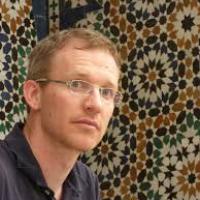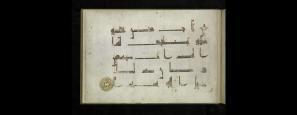People

Nicolai Sinai (PhD Free University of Berlin, 2007), QuCIP’s Principal Investigator, is Professor of Islamic Studies and holds the Sheikh Zayed Lecturership in Islamic Studies at the Faculty of Asian and Middle Eastern Studies. Sinai’s published research deals with the literary and historical-critical study of the Qur’an against the background of earlier Jewish, Christian, and Arabian traditions; with pre-modern and modern Islamic scriptural interpretation; and with the history of philosophical and theological thought in the Islamic world. His most monographs include The Qur’an: A Historical-Critical Introduction (Edinburgh 2017), Rain-Giver, Bone-Breaker, Score-Settler: Allāh in Pre-Quranic Poetry (New Haven 2019), and Key Terms of the Qur’an: A Critical Dictionary (Princeton 2023).

Marianna Klar (DPhil, Oxford, 2002) is a researcher at Oxford’s Faculty of Oriental Studies, Senior Research Associate at Pembroke College, Oxford, and Research Associate at the Centre of Islamic Studies, SOAS. Her most recent publications focus on the Qur’an’s structure, its narratives, and its literary context. She has also worked extensively on tales of the prophets within the medieval Islamic historiographical tradition and on Qur’anic exegesis. Her monograph on al-Thaʿlabī’s Tales of the Prophets was published in 2009, and she is the editor of Structural Dividers in the Qur’an (2021).

Holger Zellentin is Professor of Religious and Jewish Studies at the University of Tübingen. He holds a PhD from Princeton University, and has previously held faculty appointments at the Graduate Theological Union and the University of California, Berkeley, at the University of Nottingham, and at the University of Cambridge. He has worked on Hellenistic and rabbinic Judaism and on the relationship of the Qur’an to late antique law and narrative. His publications include The Qur’an’s Reformation of Judaism and Christianity: Return to the Origins (edited volume, 2019), The Qurʾān’s Legal Culture: The Didascalia Apostolorum as a Point of Departure (2013) and Rabbinic Parodies of Jewish and Christian Literature (2011).
https://uni-tuebingen.de/en/faculties/protestant-theology/chairs-and-institutes/religious-studies-and-jewish-studies/religious-studies-and-jewish-studies/zellentin-holger-prof-dr/

Ruth MacDonald is the Project Coordinator for QuCIP, providing administrative and finance support to the PI and other members of the team. She has a PhD in Classics from Royal Holloway, University of London (2017) and previously worked in widening participation before joining QuCIP in 2019. She is the first point of contact for any queries relating to the project.

Nora K. Schmid holds a PhD in Arabic Studies from the Free University of Berlin (2018). She has previously occupied research positions in the Corpus Coranicum project (Berlin-Brandenburg Academy of Sciences and Humanities, 2007–2012) and in the Collaborative Research Center 980 “Episteme in Motion: Transfer of Knowledge from the Ancient World to the Early Modern Period” (Free University, 2012–2018). In 2016, she was a Global Humanities Junior Fellow at Harvard University. Her research interests include the Qur’an as a late antique text, Arabic asceticism, and the intellectual and literary traditions of pre-Islamic Arabia. She is a co-editor of the volume Denkraum Spätantike: Reflexionen von Antiken im Umfeld des Koran (Wiesbaden 2016).

Behnam Sadeghi was a postdoctoral researcher on the QuCIP project from April 2019 to December 2023. His research focuses on the history of Islamic thought in areas such as jurisprudence, gender, and theology. He has written a book on philosophy of law: The Logic of Law Making in Islam: Women and Prayer in the Legal Tradition (Cambridge University Press, 2013). He also has publications on the early history of the Qur’an and the Hadith.
Behnam has taught courses on premodern history, gender, method in the social sciences, social theory, theory in the study of religion, the history of moral theory, and virtue ethics.
At Oxford, he did most of the work for a book on demographic history.

Saqib Hussain is an Assistant Professor of Qur’an and Early Islam at Loyola Marymount University. He holds a doctorate from the University of Oxford (2022) and was affiliated with the QuCIP project from 2018 to 2022. Saqib studied for several years in Damascus and Cairo, focussing on Arabic and Qur’anic exegesis. He is also an experienced Classical Arabic teacher. His DPhil thesis is on the term “wisdom” in the Qur’an and its possible connection to late antique notions of natural law. He has published articles and book chapters on gender relations in the Qur’an, the Prophet’s supernatural visions in the Qur’an in light of pre-Islamic Arabian cosmology, and Qur’anic textual criticism.

Ohad Kayam defended his DPhil thesis at the University of Oxford in 2023, having held the Sheikh Zayed Graduate Studentship in Islamic Studies, and during his doctoral studies was affiliated with the QuCIP project. His research interests include Qur’anic exegesis, Semitic languages, and linguistics. In a recent article, he investigates the manner in which the verb kāna (“was”) is utilised in order to maintain the end-rhyme in the Qur’an. Qur’anic Arabic is also the focus of his dissertation, which examines the language of the Qur’an from a linguistic point of view with a special attention to rhyme.



